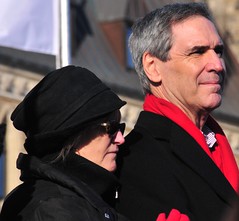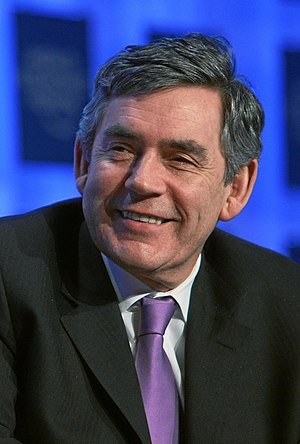 Image by John Hansen via Flickr
Image by John Hansen via Flickr- Jack Layton:
- Nationwide: 43% approve, 26% disapprove, 31% DK/NR
- NDP: 69% approve, 11% disapprove, 20% DK/NR
- Stephen Harper:
- Nationwide: 33% approve, 49% disapprove, 18% DK/NR
- Conservatives: 79% approve, 9% disapprove, 12% DK/NR
- Michael Ignatieff:
- Nationwide: 20% approve, 48% disapprove, 29% DK/NR
- Liberals: 45% approve, 30% disapprove, 25% DK/NR
This raises three points: (1) Can you trust polls like this, or do they really mean anything? (2) Why has Ignatieff been so unable to engage the public? (3) At what point to the Liberals concede that Ignatieff is perhaps a net loss to the party and, that after three consecutive uninspiring party leaders, there's something amiss about how they're choosing prime ministerial candidates?
It's the first question I'm more anxious to address. I think Canadians like to see our electoral system as a bit more technocratic than, say, our southern neighbours: that the cults of personality that happen down there, exemplified by the recent electoral season where the Democratic primaries offered a more gripping political campaign than the actual election, tend to be less important that partisan politics. Up here, we vote for the party here, not the person - both literally, in describing the Westminster system, and figuratively, in describing our approach to politics. I think there is some truth to that, but less than we might imagine. The CPC, for example, truly is Harper's Party, and it's tough to see how his eventual departure from politics could be anything but earth-shaking for the party. New Democrats rally around Layton all but unanimously, and NDP campaign brochures often feature his mustachioed face more promintently than whichever local candidate voters are meant to vote for. The Liberals, by extension, seem positively headless: a body without a head has neither a brain to control its varied components nor a mouth to verbalise a common purpose. It's tough to imagine how this situation can be anything less than traumatic for the party - and a major reason why stasis has set in among voting intentions at the moment.
Actually I don't think it would be unfair to say that at the federal level, unlike in the UK or in British Columbia, this stasis is the effect of a weak middle: generally speaking, a poll that shows, for example, Conservatives up and NDP down in Canada rarely shows much transferrence between the two parties. Instead, it shows that a certain percentage of people drifting from the Liberals to the CPC is supplanted by an equal percentage drifting from the NDP to the Liberals. A weak centre creates an unbridgeable gap between two precipices: Conservatives on one side, who have put their stakes down to a degree unprecedented on the national scene in decades, and the Continent of Leftist Parties on the other side, where voters may freely wander between parties, or toy with different parties before eventually voting Liberal.
I think the main reason Ignatieff has failed to spark much support is something similar to the criticisms currently being levelled against the Republicans in the USA: that he seems to be against much but for little. Ignatieff gives the impression of someone who has taken too literally the title of "Her Majesty's Opposition": a dedicated insistence on opposing everything Harper says leads to criticisms of politicking for its own sake, and of potential hypocrisy. Ignatieff seems oddly unable to focus the anti-Harper sentiment that exists into any real force, and as such it merely builds and disappates, while pro-Harper sentiment, the mere 30-some-odd percent that it is, solidifies.
The third question is something only the élite at the LPC can truly answer. I think there's a fear that prolonging a stream of lame-ducks from Martin to Dion to, seemingly, Ignatieff and perhaps beyond would be worse for the Liberal brand than propping up Ignatieff past his sell-by date for the sake of consistency. They might also not want to appear too bound to the whims of the public, who after all can change their opinions of people (Ignatieff started off with good levels of support, for example). But it does increasingly appear that Ignatieff is the wrong man for the job: the job he has (party leader) and the job he wants (prime minister). To the extent that the party's fortunes are bound to their leader's fortunes, that's a question the party might want to address soon rather than later.

![Reblog this post [with Zemanta]](http://img.zemanta.com/reblog_e.png?x-id=cf91f430-64f0-48e8-ac7d-336864c75e45)

![Reblog this post [with Zemanta]](http://img.zemanta.com/reblog_e.png?x-id=4aa2da57-fcdf-4709-a324-de782051d293)

![Reblog this post [with Zemanta]](http://img.zemanta.com/reblog_e.png?x-id=85ce0f1b-e472-423a-9d5a-1d0fc8cc47ba)

![Reblog this post [with Zemanta]](http://img.zemanta.com/reblog_e.png?x-id=0e7450d9-e449-4e8e-8977-8ce7d0b29b63)

![Reblog this post [with Zemanta]](http://img.zemanta.com/reblog_e.png?x-id=89f42e71-507d-4538-989d-9f8ea3c67304)

![Reblog this post [with Zemanta]](http://img.zemanta.com/reblog_e.png?x-id=b6f986dd-3995-4a2a-91f7-0c56b313fba1)